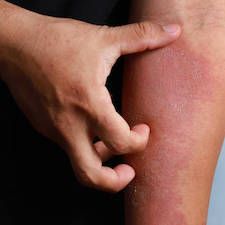Domestic Hard Water Linked to Increased Eczema Prevalence in UK Adults
Previous literature indicated a higher prevalence of eczema in children who live in areas with hard water, but this association was not explored in adults until now.

Increasing levels of domestic hard water, which is defined as domestic water with high mineral content, were associated with an increased prevalence of eczema in adults in the United Kingdom.
However, these levels were not associated with increased incidence of eczema.
Previous literature indicated a higher prevalence of eczema in children who live in areas in which hard water is common. Yet this association was not explored in adults.
“A better understanding of (the association) may provide evidence to generate targeted interventions to decrease eczema flares and severity,” noted lead study author Diego J. Lopez, PhD, of the Allergy and Lung Unit at the University of Melbourne.
As such, Lopez and fellow investigators considered the impact of domestic hard water supplies on eczema outcomes in middle-aged adults.
The team amassed data on all people 40-69 years old who were registered with the National Health Service and lived roughly 25 miles from any of the 22 study assessment centers in Scotland, England, and Wales, through the UK Biobank cohort.
Data was collected at baseline (2006-2010) and follow-up (2013-2014).
Overall, demographic, socioeconomic, and health-related data was obtained for 502,650 people in the UK Biobank.
Using Ordnance Survey references and the Ordnance Survey Code-Point, Lopez and colleagues identified the home location and postcodes of each participant, while data on domestic water supply was culled from local water supply companies in England, Wales, and Scotland.
Meanwhile, eczema prevalence was assessed at baseline and follow-up while incidence was determined via touchscreen questionnaires and interviews from nurses.
In total, 306,531 participants with a mean age of 57 years were included in the baseline analysis. These individuals were scattered across 7642 postcodes, and the follow-up analysis featured 31,036 participants across 3695 postcodes.
Investigators noted that the increase in domestic hard water was linked to increased odds of prevalent eczema at baseline (OR: 1.02 95% CI 1.01-1.04) per 50 mg/L of CaCO3 increase, or concentrations of calcium and magnesium in the water.
A significant linear trend was established (P<.001), and these estimates were similar regardless of adjustments made for area level measures of socio-economic status.
Notably, the number of eczema cases attributable to domestic hard water was roughly 451 per 10,000 persons.
Lopez and colleagues suggested that the ongoing efforts in reducing hard water exposure in the UK could play a “relatively small beneficial effect” in reducing eczema prevalence in adults.
"Furthermore, the estimates of clustering effect by postcodes in eczema outcomes although small,remain mostly unexplained by area level socioeconomic measures,so further research is needed to explore which geographical factors may lead to eczema," they wrote.
The study, "The association between domestic hard water and eczema in adults from the UK biobank cohort study," was published online in the British Journal of Dermatology.